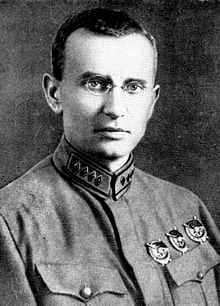Ieronim Uborevich
| Ieronim Petrovich Uborevich | |
|---|---|

Ieronim Uborevich
|
|
| Native name | Jeronimas Uborevičius |
| Born |
January 14, 1896 Užpaliai, Lithuania, Russian Empire |
| Died | June 12, 1937 (aged 41) Moscow |
| Allegiance |
|
| Years of service | 1916–1937 |
| Rank | Komandarm 1st rank |
| Commands held | Belorussian Military District |
| Battles/wars | |
| Awards | Order of the Red Banner (three times) |
Ieronim Petrovich Uborevich (Lithuanian: Jeronimas Uborevičius; January 14, 1896 – June 12, 1937) was a Soviet military commander of the Red Army during the Russian Civil War. He eventually attained the rank of Army Commander, 1st Rank, equivalent to General of the Army after old Imperial ranks were reintroduced in 1940.
Uborevich was born into a Lithuanian farming family in Užpaliai. From 1909 to 1914 he studied at a high school in Daugavpils in Latvia. In 1914–15 he attended the Petrograd Polytechnic. He joined the Konstantinovskoye Artillery School in 1915 graduating in 1916 and joining the Imperial Russian Army.
Uborevich began his military career during World War I, serving as a junior officer in the Imperial Russian Army. He joined the Bolshevik Party in March 1917. In January 1918, he commanded a detachment of Red Guards in Belarus and was captured by the Germans but escaped. During the Russian Civil War, he served in a variety of command posts in the Red Army, commanding the 9th, 13th, and 14th Armies. He fought alongside Mikhail Tukhachevsky in the Polish–Soviet War and in suppressing the Tambov Rebellion in 1921. In 1922 he became War Minister of the short-lived Far Eastern Republic, a buffer state between Soviet Russia and Japan.
In 1925 he became commander of the North Caucasus Military District, and then in 1928 the Moscow Military District. He served as the Red Army's Chief of Armaments from 1928–1931 and Deputy Chairman of the Revolutionary Military Council from 1930 to 1931. From 1931–1937, he was commander of the Belorussian Military District, one of the two (along with the Kiev Military District) key commands that would bear the brunt of any Soviet war along its western border.
...
Wikipedia
